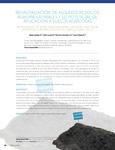Revalorización de algunos residuos agroindustriales y su potencial de aplicación a suelos agrícolas
Date
2016-09-23Author
Rosas-Calleja, David
Ortiz-Laurel, Hipólito
Herrera-Corredor, José Andrés
Leyva-Ovalle, Otto Raúl
Metadata
Show full item recordAbstract
La generación de residuos, también llamados subproductos de un sistema productivo, son inherentes al mismo. Los procesos de la agroindustria azucarera, cafetalera (café en grano y solubles instantáneos) y tortillera (tortilla y masa) generan volúmenes importantes de residuos, que generan costos adicionales para su manejo y disposición final. Una alternativa de revalorización es considerar su uso como abonos orgánicos (compostas), o bien, como generadores de energía. Los residuos de café, como la borra, y de la industria tortillera, como el nejayote, han mostrado un potencial también en el área bioquímica de la producción de alimentos. Se documenta la generación de tecnología adecuada para su manejo y transformación en materiales con valor agregado que contribuyan a la propia industria, reducción de riesgos al ambiente y áreas agrícolas. ABSTRACT: The generation of residues, also called byproducts, from a productive system, is inherent to it. Processes of the sugar, coffee (grain coffee and instantaneous soluble coffee), and tortilla (tortilla and dough) agroindustry generate important volumes of residues, which generate additional costs for their management and final disposal. An alternative of revaluation is considering their use as organic fertilizers (composts), or else, as energy generators. Coffee residues, such as dregs, and from the tortilla industry, such as nejayote, have shown potential also in the biochemical area of food production. The generation of adequate technology for their management and transformation into materials of added value, which contribute to the industry itself, the reduction of risks to the environment and agricultural areas, is documented.

